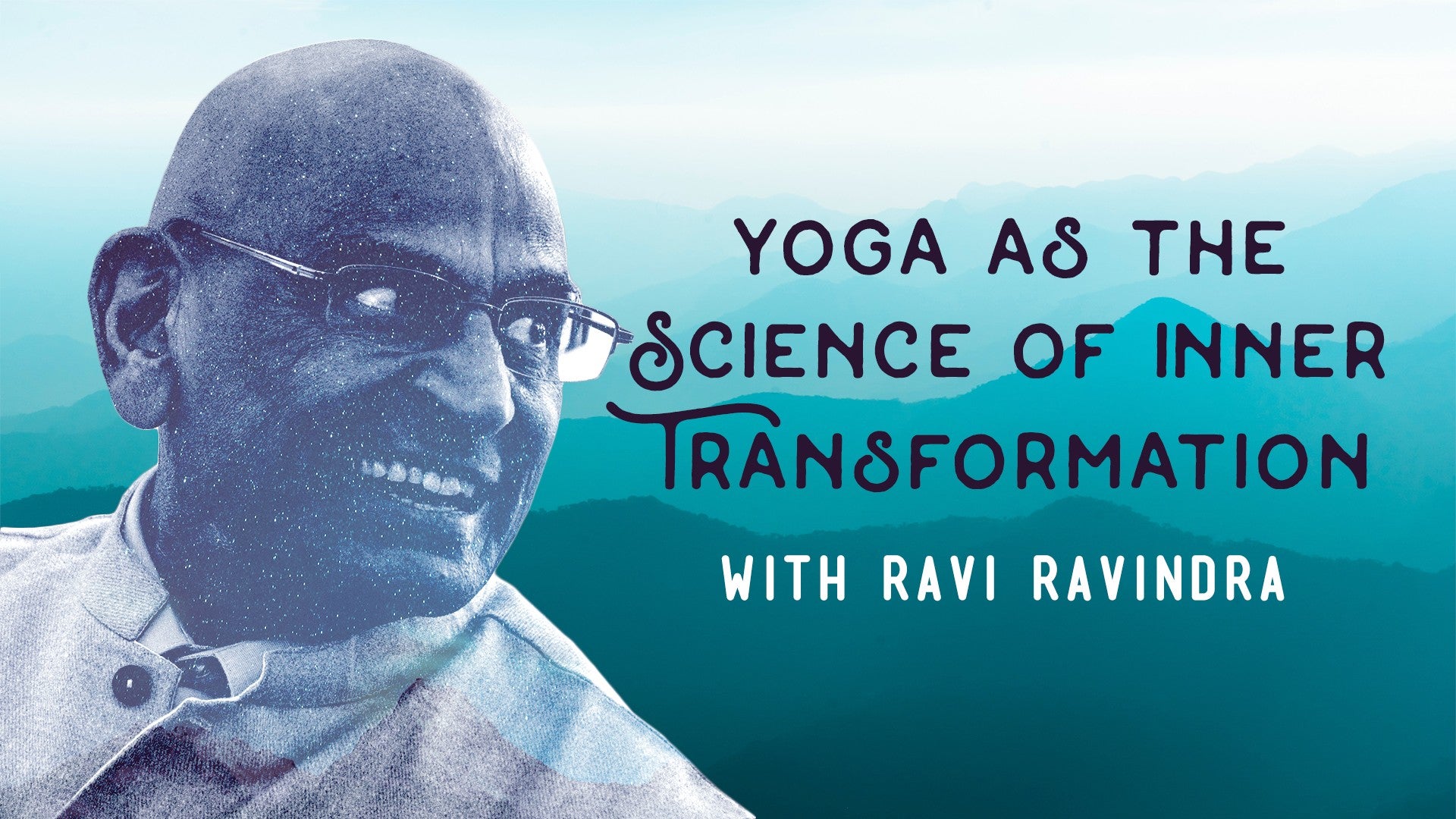Description
About This Video
Transcript
Read Full Transcript
Chapter 1
Personal Practice
It's a good occasion for us to engage in some question answers, but I should make one or two general remarks. Really a person is strictly speaking alive internally only when they are in question. Any informational questions can be asked, those are easy to answer, but really any serious questions of anybody can be answered only by the person himself or herself. The wish is that you're raising a question and if I can in whatever sense enlarge the question that it may become a quest for you. Ultimately it is not that I have a question for any serious person, it is more a matter that I am in question.
So as fellow searchers you are absolutely welcome to bring whatever interests you. I have a question, so I'm curious, what are your personal daily or weekly disciplines that allow you to stay connected to Brahma and the sense of wonderment that you describe? And I'm also curious how they have changed as you've aged and studied this work. An interesting question, for me personally I always feel partly because at my present stage I'm travelling a great deal, especially while travelling even more so to undertake some fairly regular simple yoga asanas. Even though sometimes it means I have to have a little less sleep, but I find even that's much more helpful.
It keeps the back in good shape and the body in reasonably good shape. So that is one thing. But I know many people tend to have their yoga asanas, then they tend to have a shower or a bath. I do it in the reverse direction because I'm not sweating with my asanas, so I actually take whatever morning ablutions one has to shave and shower, etc. Then I would undertake the asanas, then immediately following it, a little pranayama, very simple.
For me actually largely it is just watching the breath. But a simple analom-vilom is a very simple pranayama. And then meditation. And it's not that one needs to get so attached to one thing or the other. I'm actually much more interested in just watching what is taking place in me.
And increasingly it seems fairly obvious to me that I didn't create myself, I did not create this apparatus that breathes, nor the air that is breathed for it to be alive. So to me it's increasingly really a kind of an obvious in a way, obvious but very mysterious. Why in this vast cosmos where all the great sages say there are intelligent energies, conscious energies, have bothered to produce me for a few decades? So for me this is a question I return to very often in my meditation. So whether then it keeps me a little less me, me, me, and also reasonably healthy breathing.
Of course if you go past some cities like Delhi which are so polluted you still manage to catch cold or something or the other, it's very difficult to avoid it. But in general I'm actually reasonably healthy for my age. And my doctor doesn't believe me that I'll be 80 years old in a few months. He keeps thinking I have made a mistake somewhere on my certificate. So is this a daily discipline?
Yes. Okay. And how often, how long do you meditate, I'm curious, is it different every day? Well that varies, that varies, every day but that varies. And it can really even be five minutes because meditation doesn't mean to sit down necessarily although it's a good help to do that.
It could even be while you're brushing your teeth you can meditate, it's very interesting. Meditation really strictly speaking means to be a little free of self-occupation. So the time part, of course I should have added another thing which would be also helpful. For me it's a helpful thing to read or actually my partner and I, she often reads and I listen to it at the end of the meditation. Some part of, some text that calls for a larger vision, you know the main problem I think we all have, including me, is whether we like it or not we are really committed to the smallness of ourselves.
You know, where do I go next, what do I gain, does somebody admire me or how do I get more money or less money, you know all that is, that is almost such a call to smallness all the time. So even a text which can be a little bit of a reminder of a larger idea or a larger undertaking. I may not be connected with it but the fact is that it reminds something. So I find it very helpful. So we actually, again there are occasions when we can't manage it, there is a rush or we are in an aeroplane 17 hour flight or whatever, but generally we I think manage to read something even if just a paragraph.
And is it always in the morning that you do your practice, not in the evening? Generally in the morning although there are occasions when we would have it. We are also very fortunate that, by the way, I don't go, I mean I say I'm travelling a great deal but I don't go anywhere except when I'm invited. So the reason for saying that is that almost everywhere I'm really much more interested and that is the opportunity to connect with fellow searchers. Now therefore then together we would meditate or address serious questions in life or read certain common texts.
So in fact, all my travelling for just visiting nightclubs or beaches is not my idea. That's not what I do although as I said I end up travelling these days almost six months a year actually I'm away from home. But almost everywhere meeting people of serious interest in life and also I am particularly interested that I've been very fortunate to be invited by people who have very different religious and cultural backgrounds. It sometimes surprises my friends that for last my goodness more than you know my book on the yoga of the Christ was published in 1990 which is now as you can see 28 years ago and many groups which are very Christian oriented culturally invite me to speak about inner dimensions of Christianity because these are just labels whether I'm a Christian if I happen to be born in Saudi Arabia I would be labeled a Muslim. You see what I'm saying not to get occupied with the labels but there are serious people everywhere wishing to really understand what Christ actually taught.
Things are easy but how does it apply to me? Can I really love my neighbor especially the neighbor who is such a pain in the neck? You know what I'm saying I mean in a way similarly of course great teachers Krishna has remarkable teaching in the Bhagavad Gita or the Buddha and one can't read everything but allow the possibility that the great sages in every culture have remarkable things to say even theoretically even though for example I'm not really that familiar with what Lao Tse brought but I acknowledge the possibility that for many people in China he was a great sage. If I had enough time enough energy I would be happy to study this but one has limitations of time and of course now I'm retired but earlier I mean if one has a job I was a professor in far too many departments but that requires a certain you know unless you publish they don't promote you or give you you know the kind of thing I'm meaning so one has to to pay one's dues in the world one is in but that can also free one not to be how much is enough is a serious question. All right Robby I have a question for you and I'm interested in this process of seeing
Chapter 2
Elevate Beyond
when in part of self-study when we're looking also at some of our deep suffering and I'm just curious about that whole process of how you know how you can elevate yourself beyond the suffering and I'm curious what your process has been outside of just meditation as you speak with the breath and observing through you know seeing eyes what are your other ways to do this and how long does it take to get over deeper suffering that you've experienced in your life or does it become sort of an internal wisdom eventually that we learned from some of these deeper problematic things that we've been through in our lives so I'm just curious just to understand your process of how you elevate beyond some of the deeper suffering you've experienced in your life and if you can share some wisdom on that or shed light on that I would that would be really wonderful but you know in a way we need to see that we have each one of us you me actually many levels of the self whatever I call myself there is the very egotistic level completely self-centered self-occupied but on the other hand as we even in the talks recently been speaking about that there is also a a particle of divinity in each one of us so that is also ourselves and so the whole when we begin to look at ourselves more and more impartially we would see that the if you like the lower this is just a manner of speaking or the shallower side or the more egotistic part of me doesn't want to be seen it wants to as it were if I see something it wants to something undesirable about it it wants to improve but it remains something driven by the ego itself so as one begins to see more and more impartially and that actually does require steadiness and also talking with fellow searchers is always a great help in this kind of thing and then gradually even the not so much wanting to improve myself because this itself actually comes from the ego on the other hand increasingly not to be against the ego I was particularly struck by maybe if you don't mind I give a little bit of a background my own teacher has been madam the Salzman who was responsible for the whole teaching brought by Gurjif after he died in 1949 until her own death in 1990 at the age of 101 and I had of course met her actually in 1969 but I started closely working with her only in 1980 when she was already 91 years old but very energetic and one of the things that gradually became clearer and clearer how to impartially look at oneself and that very look actually changes something which is what I tried to say earlier that transformation is a consequence of clear perception but there is naturally resistance also but on one occasion I was particularly struck by my own vanity much more than now if you can imagine that and so I said to her that I am actually fed up with my vanity because it gains me nothing and I just waste energy on it she looked at me and I was very struck by her comment she said if you did not have vanity what will you do she said all our action comes from our ego so there is no need to be against the ego ego is a good servant but a bad master and who needs a servant who just wants to hang around do nothing so you need a strong ego but if the servant begins to make all the decisions in the household then where the problem comes and then she actually invited me to think of any of the great sages she actually mentioned the Buddha and Christ do you think they did not have an ego but they were not driven by their ego their ego then becomes the strength they have decided this and they're going to stay with it Christ could not be on the cross without a strong ego but he's not driven by the ego he's submitting himself to something subtler than himself so I was very struck by her comments that's why I'm repeating them here that we can just become against the lower side of ourselves there is no need to be against it but not to allow it to run my whole life it has its place then of course one begins to understand even the classical remarks in the scripture slightly differently so when Christ says give one to Caesar what is Caesar's what that requires a fair amount of ego to give one to Caesar what he sees that's not the phrase he's using so one actually begins to even understand the scriptures a little differently the same remarks have a slightly different meaning attached to them so to watch this and then gradually also one begins to realize there is another aspect of self knowledge one can begin which is where one I suppose ends up beginning from what is specific to me where I was born what did my father do etc but that kind of self knowledge is not much to write home about really but if you go a little bit deeper then the word self knowledge is not even correct anymore it actually becomes the knowledge of the human condition what is deeply true for me is also deeply true for you and now this is maybe just a theoretical model that we are specially applicable in the Indian perspective that we have many layers and layers within ourselves and if I remain on the surface of myself and you are on the surface of yourself we have a large distance between us if I remain at the surface of myself and I can look at your surface we have a large distance between us and if I can go a little deeper I come closer to your own depth now purely taking this as a geometrical image if I can go absolutely to the center of this circle that I am in I come close to your center and the idea is very strong idea particularly in the Indian tradition that at the very center of myself and at the center of everybody is Brahma so deeper I go into myself I get closer and closer to the human condition the human knowledge and therefore it's not any longer just self knowledge in the usual sense of the word one needs to put a slightly capital letter to S it becomes closer and closer to self with the capital S letter and therefore naturally a little bit more compassion arises for others because others are just like me they of course at the surface I mean hey you are a female I'm a male but deeper down do you think the Holy Spirit is male or female it's what sense would it make so I think one begins to realize that there are surface differences have their own logic their own place there is no need to be against that but that is only the surface of things deeper down slightly different laws apply well thank you I think I also hearing that if we can accept the things that have happened or that we've caused in our life in the in the view of the human experience on a deep level as and also as lessons then we can look at it with the eyes of differently different eyes yeah one of the things which I find very helpful reminder actually especially in moments of great bewilderment or something maybe even a certain kind of annoyance has taken over me etc if I often ask myself how would Madame de Sosman respond in this situation now I have heard people say that in fact I occasionally ask that myself how would Christ respond in a situation like this how would the Buddha respond not that that's where I am there is no need to fantasize but they are always a reminder of something completely impartial and coming from a level which is not just me me me there when we say impartial partly what they have a grander vision or a higher vision if you like so it's it therefore it's a very important suggestion actually in a lot of Indian literature the phrase that is used is to have your isht devata which is to say who would be your ideal it can be a mythological person or somebody you have actually met and so then it can be a very important corrective in one's own life how would my whosoever I am regarding as my ideal person how would she or he respond and it's slightly ironic actually in my case it may seem slightly weird even to me personally that the two of the main people who I would regard have been my teachers in fact one of them I even call my spiritual mother my book on the Bhagavad Gita is dedicated to her mrs. Welch so they have both been ladies and even in the theoretical society there are people have been very nice to me actually three people who have been most influential in me have been women it's rather interesting that I seem to be more influenced by women than by men although Krishnamurti was he was a feminine man no but actually male female is only the externalities these people actually combine great deal of both activity and receptivity effort and grace they are really very good examples of this at least in my experience the people I have met some very remarkable people so that's a good reminder to oneself to find somebody where you can even initially theoretically say how would she or he respond to this situation it shifts immediate kind of reactions there is a lot of negativity in the world this is true and it we end up reflecting this how not to add to this there is enough problems in the world as it is thank you Ravi could you please speak a bit about what you refer to as the benediction of the
Chapter 3
The Devas
Davis and about how these forces or energies intersect with or might take an interest in our human lives yes but that's actually a very interesting question first of all really one doesn't need to easily accept this but my own feeling is and in any case that's what all the spiritual teachings say that the whole universe is emerging or is being created by the highest level of consciousness variously called God or Brahma or Allah or simply the absolute there are many phrases that got used but what that means in practice that the creation of the universe and that of course also includes you and me is not coming randomly it's not coming from the lowest level of consciousness which is unfortunately the contemporary scientific point of view that it comes from dead matter somehow particles of matter came together and maybe somehow the life began and then somehow unicellular life then we get multicellular life and then somehow intelligence emerged etcetera but all the spiritual teachings say universe didn't begin from below it began from above by above I mean the highest level of consciousness and therefore the implication is that the creation of the universe and therefore everything else in it including you and me is not pointless it is not just a random accidental happening that there is a purpose to this now on the other hand all the serious teachings for example I have mentioned more than once that in the Bible you have nine orders of angels between God and human beings similarly in any other teaching there are many levels so it's not necessarily that I am being created by the very highest level ultimately that is so but even one or two levels above myself are responsible of the input into my life because a very simple reminder again and again I have been saying this I didn't create myself I didn't create this breathing apparatus or the digestive process or anything if I were in charge of the universe it would be a total disaster I would not know where to stop the growth of my nose it will just go on and on would you know you see we forget that we are not running the world now if we can actually understand that then either we say it's completely random accidental which unfortunately is the prevailing view but to me that makes absolutely no sense if I say there is some rhyme or reason behind this that my existence has some purpose even let us theoretically say that may not even be true but it still gives more meaning to my search to my life even if it is just a fault idea if you like I don't actually believe it is a false idea but even if it were it gives more meaning to it rather than that it is completely accident so it doesn't matter what I do in fact you read some of the existentialist literature like Dostoevsky for example it doesn't really matter what one does it's all completely useless random anyway so if one takes the other perspective which is what all the scriptures say by the way it's not that I'm just making it up then the benediction of the devas is a way of saying that there is an input from the higher level than just my level ordinarily we sometimes call it especially if one succeeds in something one says so and so was lucky or he had good luck or if one fails we say he had a bad luck well that is really basically saying we don't know why it happened but or sometimes we do people do end up saying well that was his destiny to succeed or destiny to fail maybe no so the benediction of the devas really is an acknowledgement that there are forces subtler or higher than myself and that those forces are responsible even in what I am calling my own action or my activity and therefore the suggestion for example I had quoted this from the Shweta Ashweta Upanishad that all human realization is a combination of tapas prabha that is to say the effect of human effort and deva prasad which is the benediction of the devas devas are like saying angels this is a way of these various levels like in the bible nine orders of angels we tend to sort of slightly fix them just to be able to speak about them but similarly the devas there are many levels of the devas and but more importantly again and again a reminder that neither my birth nor the success or failure of anything I do wholly depends on me that there are larger or subtler forces which is all what devas actually mean subtler forces but very strong suggestion more emphasized in India than generally in the biblical tradition although there also you find very much the same that these forces are also inside me they are at different levels of myself so if I can allow usually the suggestion is that my surface levels which tend to be more personal more egotistic end up having more energy because they are the ones which are constantly being nourished and the deeper levels become weaker and weaker because they're not being fed and therefore even though sometimes I have a clear idea what I need to do one might even say that is a wiser perspective or a larger understanding but not enough energy in them and the lower perspective tends to therefore conquer because they are stronger even though they have a lower vision or a less vision but they end up winning so the input that you spoke of then necessarily happens in relationship it has to be a two-way street yes that is actually in fact thank you for in fact raising that question Krishna in the Bhagavad Gita especially in the third chapter explicitly says that the devas nourish you but you must nourish the devas there is if you like a reciprocal maintenance we forget sometimes particularly when one gets a little fed up and tired with the maybe just the money-making business world that that is also part of the universe without all of that business world I couldn't even be here I could not fly if there were no technological developments so not to be against the whatever I may call lower world not to be against it that also has its place in the creation but do I need to be stuck at that level so not to be against the whole creation but very interesting suggestion actually again this is in all the tradition it doesn't get emphasized so much by the Christian theologians but it is there in the Bible that each level of creation is wishing to return to God wishing to so therefore each level is trying to rise and including you and me wishing to rise and then the devas this is one of the roles they play they can assist us to rise but they also need us we must remember again and again Krishna also needed Arjuna it's not only that Arjuna needed Krishna Christ also needed the disciples not only the disciple needed Christ because the teaching cannot continue without the disciples so both sides are required so when we speak about the benediction of the devas that is in a way speaking from one side can I allow myself to become receptive to something subtler than my usual level in fact this is one of the meaning of purposes of meditation sometimes some people or some scriptures even put in very strongly in fact that you have to die to the world at least I think every occasion of meditation is a temporary withdrawal from the world that for the next 10 minutes 15 minutes half an hour I'm not interested in the world although again one has to see sadly I see many people when the phone rings they still go for it etc so how can I be free temporarily of the world so the benediction of the devas is really allowing a subtler energy first of all accepting that there are many subtler energies and that they are in any case having an action on me and then one can specially invoke them by becoming more and more receptive to them just to take a specific example of a deva in the Rig Veda which is really the most ancient text in any Indo-European language and is regarded as the source of the whole of the Indian tradition all the rishis which is literally mean the sages or the seers many of them first of all there are nearly 1000 rishis in the Rig Veda and about 50 of them are rishikas which is to say female rishis but each of the rishis some of them have only one hymn some may have five or seven hymns but the first hymn of all the rishis is to the deva agni which literally means fire and in fact the very first word in the Rig Veda is agni om we attach om for everything om agni mele purohitam this is how the Rig Veda begins and but agni therefore is regarded as the first of the devas but not the highest deva it can then the call is that it becomes the priest priest literally means in that context that it becomes pontiff the bridge between higher and higher devas so agni can be taken completely externally which is what often happens in the culture that no Hindu sacrament of any kind whether it is wedding or name giving or funeral or anything can take place without the presence of fire if some of you may have seen Hindu weddings the couple will go around the fire seven times so agni becomes externalized and therefore it's easier to see this as I have said even earlier also that transmission of culture actually requires subtle realities to be externalized but the actual process of spiritual development is in the reverse direction so agni is in fact more than anybody else in contemporary times Sri Aurobindo has very much spoken about it that agni is the fire of inspiration fire of effort and this is the first deva without this one cannot come to any higher deva the highest deva by the way is Sun illumination another name for the Sun in Sanskrit is Ravi and so I have to remind myself that it's a very high call and but more importantly there would be for one can come to the spiritual illumination one needs to begin with the inspiration with effort which is why the sometimes we can joke about it but there are in the last two decades there are three or four books like fire in the equations fire in the belly fire in the mind obviously this is not external fire but it can then become symbolic usage of the expression so the deva when we speak about the benediction of the deva is partly they are inside us but one needs to begin with the first deva which is to do which is why I mentioned this the other day that tapas which is highly recommended by Patanjali literally actually means temperature that's again to do with the heat created by the effort if you like the temperature created by the effort so devas not to be understood completely externally but that doesn't mean that I have a possession of them only me have the devas others can also have the devas so in that sense they are both outside and inside remember this repeated comment of Christ the kingdom of God is within you and without you it's also outside it's not fully possessed by me but it's also inside me in fact the very strong idea in all great traditions that in principle the entire external cosmos can be understood internally that the micro cosmos in principle mirrors the whole large cosmos in fact in Patanjali's yoga sutra that becomes the way of doing natural science to do for example to study the structure of the the whole solar system you don't go outside as we would do in science what he's saying is to find the correspondence inside for him for example corresponding to the navel and if you can really understand the whole structure there then you can understand what's taking place outside it's a very interesting it's a different orientation to doing natural science that everything outside can actually be found inside that we are in principle a like a hologram of the whole universe it's rather a different orientation so the devas are not to be understood completely externally but that doesn't mean that they're just exclusively in me it's just like saying deep down I discover that I am Brahma that doesn't mean I alone I'm Brahma so are the others so thank you very much we'll ask another question yeah I have a question for you Ravi how would you describe
Chapter 4
Quality of Sincerity
more fully the quality of sincerity and maybe there's a technique or a way that you personally maintain that sincerity especially in terms of your daily affairs and more of the maybe the lower levels of consciousness well I don't really know whether there is any particular kind of a technique to this but it is really largely to do with one's own conscience if I decide let us say it's always interesting to try this that I am going to try something today even I can suggest very simple little exercises for this for example if there is somebody supposing you are working in a company or wherever you work there is always bound to be somebody who you have slightly less happiness to be next to them than with somebody else and then a little exercise you can take supposing you were to be this person's advocate in the presence of St. Peter that he or she should be allowed to enter heaven what can you possibly find about this person it's an exercise and then maybe you would intentionally undertake to sit next to this person or have lunch with them or whatever one actually tries then in the process you see how much of you wants to resist this well maybe tomorrow we do it today it's I'm busy today and many excuse making will come I mean you can take any other exercise I'm just merely mentioning the kind of one example and then if I am sincere about my own practice then my conscience will bother me it's almost as if whatever else I mean by prayer or bowing to Christ or the Buddha it all sounds very nice but this is the real offering offering of myself even my stupidity or my resistance because I am fighting against myself remember this is one of the points I tried to make in that the dragon that St. George has to overcome has his own face if I begin to see that there are two in me one that just wants to continue its own winning and losing and earning and spending the other wishes to know the purpose of my existence and how can I serve something subtler both exist in me then one begins to see that the struggle really is an internal struggle it's not against somebody else but I undertake is an exercise or a suggestion for the day or for the next one hour it doesn't have to be the whole day depending on again to take something which is not completely easy mechanically but not so difficult that right away I'm lost so it's always requires a little bit of this is where as I said if company of fellow searches is always a great help in anything like this because different people try different things and they can honestly try to share what worked and what did not work and then the others can try the same thing but take something which is more or less manageable but not completely mechanical and then one would see the struggle struggle is always between two levels of myself and that's where sincerity then comes really that my conscience I have whosoever appeals to you supposing you're I mean I don't know about you I'm particularly for example very drawn to the image of the Buddha for me he was almost the most distinguished son of India more than any other creature so supposing I say to the Buddha in the morning today I'm going to try this and that I will report to you what I did or did not it can be so my conscience will then bother me can I honestly say this to the Buddha that I tried this so but take somebody who speaks to you or appeals to you could be a mythological figure the Buddha and Christ really are mythological let me assure you anthropomorphic but not men this was a remark because the culture adds everything to them and so they become idealized or mythologized but that's fine that can be a help but especially if you know somebody personally have met somebody who you admire deeply that's a little easier.
Yoga as the Science of Inner Transformation
Comments
You need to be a subscriber to post a comment.
Please Log In or Create an Account to start your free trial.
















